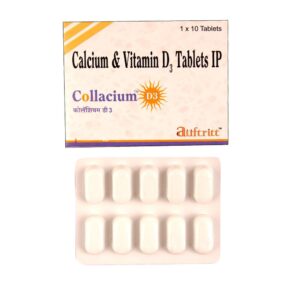CALCIUM + VITAMIN D3
Calcium: Drug Description:
Calcium is a mineral essential for numerous processes in the human body, including bone formation, muscle contraction, and nerve function. It is found naturally in many foods and is also available as a dietary supplement in various forms, such as calcium carbonate or calcium citrate.
Use:
Calcium supplements are commonly prescribed to individuals who have low levels of calcium in their blood or those who have conditions that can lead to calcium deficiency, such as osteoporosis, hypoparathyroidism, or chronic kidney disease. In addition to treating calcium deficiencies, calcium supplements may also be used to prevent osteoporosis in postmenopausal women and as a supplemental treatment for conditions like heartburn or indigestion.
Mechanism of Action:
Calcium plays a vital role in various physiological processes. In bone formation, it helps to maintain bone density and strength. Additionally, calcium is crucial for muscle contraction, including the heartbeat, and for nerve transmission. When calcium levels are low, the body may remove calcium stored in bones, leading to weakened bones and potential health issues. Calcium supplements help replenish calcium stores in the body and maintain adequate levels.
Dose:
The recommended dose of calcium supplements can vary depending on the individual’s age, sex, and medical condition. It is important to follow the instructions provided by the healthcare provider or the instructions on the supplement packaging. Typically, a daily dose for adults can range from 500 to 1500 mg.
Side Effects:
While calcium supplements are generally safe for most individuals when taken as directed, some people may experience side effects. Common side effects may include constipation, gas, bloating, or an upset stomach. These side effects can often be managed by adjusting the dose or taking the supplement with meals. In rare cases, excessive calcium intake can lead to hypercalcemia, which can cause symptoms like nausea, vomiting, excessive thirst, frequent urination, and kidney stones. It’s important to discuss any concerns or potential side effects with a healthcare professional.
Vitamin D3: Vitamin D3 is a form of vitamin D that is naturally produced in the skin when exposed to sunlight. It can also be obtained through dietary sources or taken as a supplement. Vitamin D3 is vital for maintaining healthy bones and teeth, as well as supporting immune function.
The main function of vitamin D3 is to regulate the levels of calcium and phosphate in the body. It helps to enhance the absorption of calcium from the intestines, which is then used for bone mineralization. Vitamin D3 is also involved in the remodeling of bone tissue and plays a role in muscle function.
The recommended dose of vitamin D3 varies depending on age, sex, and health conditions. For healthy adults, the recommended daily intake is typically around 600-800 international units (IU), although this may differ for individuals with specific needs or deficiencies. Higher doses may be recommended for individuals who are at risk of vitamin D insufficiency or have conditions affecting absorption, such as inflammatory bowel disease or liver disease.
Side effects from vitamin D3 supplementation are rare when taken within recommended doses. However, excessive intake of vitamin D3 can lead to a condition called vitamin D toxicity or hypervitaminosis D. Symptoms of vitamin D toxicity include nausea, vomiting, constipation, confusion, and kidney problems. High levels of calcium in the blood (hypercalcemia) can also occur, which can lead to bone pain, kidney stones, and even organ damage in severe cases.
It is important to consult with a healthcare professional before starting vitamin D3 supplementation, especially if you have a medical condition or are taking other medications. They will be able to provide personalized advice on the appropriate dosage and monitor your vitamin D levels to ensure optimal health benefits without any adverse effects.



